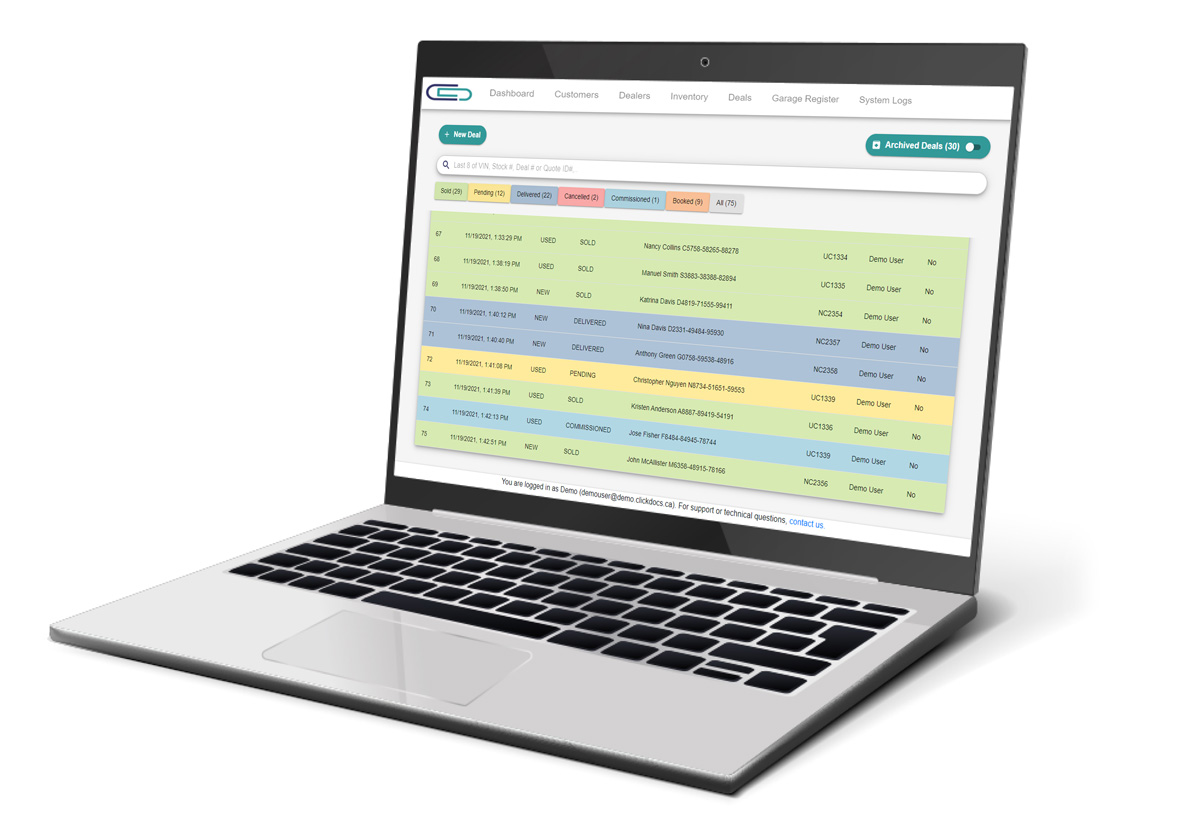
Shifting from hard-copy papers to digital files may not seem revolutionary, but one company in Ontario is striving for the dream—to streamline the entire process so dealers can go paperless.
Back in 2018, a sales manager at a luxury dealership in Toronto, Ont., wanted to go paperless after dealing with issues around things like vehicle registration and licensing forms.
Siavash Rabbani, CEO and Co-founder of Clickdocs, wanted to automate the process and allow dealerships to go paperless—or at least reduce the amount of paperwork, since the documents are typically generated from the computers in the store.
“It seems kind of archaic to print them and keep them in hard format,” said Rabbani in an interview with Canadian auto dealer. “So that’s how the idea started in 2018. My co-founder and I would get together on weekends and evenings sometimes to talk about how we could implement (some new) ideas.”
The idea to streamline the paperwork process in the sales department took form, eventually allowing the team to build on that concept and hire full-time developers. In April 2021, they officially launched Clickdocs.
The company’s solutions include an audit feature, a text/email sharing tool, an electronic garage register, an e-signature tool (DocuSign), a vehicle file, and they use the latest TLS protocols and provide each dealer with their own dedicated server.
While Rabbani recognizes that going paperless is not a new idea, as Clickdocs has competitors for each service they provide, what makes them unique is their approach to solving all of these problems—and they do that by having their employees solve each individual problem separately.
“One of the problems that we solve is storing paperwork in the cloud. Obviously, there are solutions to that—we’re not pioneers of that concept,” said Rabbani. “How we’re different in our approach comes from a dealership sales-department perspective, not as a side business.”

Siavash Rabbani, CEO and Co-founder of Clickdocs
He said the company’s approach is a “very niche” thing. A DMS for example might provide the dealership with the ability to save the documents it generates in the cloud somewhere. The login screen where employees print credit applications and submit finance applications offers the same possibility.
“But there’s no one system that takes the entire process into consideration from beginning to end with the aim and the goal to basically eliminate the paperwork,” said Rabbani.
He said the sales and paperwork process is “very backwards” in the automotive industry at the moment, and that it is “extremely” difficult for staff to do their job properly and to be compliant. The more you automate the simple things, said Rabbani, the lower the chance of audits and chargebacks from OEMs or OMVIC (the Ontario Motor Vehicle Industry Council)—or whoever the store applies to.
Trying to automate the whole process, or digitize it when there are still a few steps that require hard-copy paper, can be difficult.
“There’s other benefits too, like funding, for example,” said Rabbani. “The more organized you are from the first step, the faster you can get your money from the bank for your deals, and in-turn the less interest you pay on your floor plans. And the benefits continue on and on.”
He said it comes down to all the small things that add up over time, such as savings and dollars, and less audits and chargebacks—and for the sales department, a better workflow that can provide a better sales experience for the customer.
Trying to automate the whole process, or digitize it when there are still a few steps that require hard-copy paper, can be difficult. And unless all of these little things change in the market, Rabbani said dealers will always have that pushback.
“We’ve been told that going paperless is a dream. It’s never gonna happen,” said Rabbani. “But it seems like the industry is going in that direction. Banks started accepting DocuSign, and dealership staff and owners and dealer principals and general managers are slowly starting to realize that this is not something that is going to be a choice anymore. It’s just what’s going to happen.”
Asked about the company’s future plans, Rabbani said their main focus for now is more integration. After all, the more they integrate, the more they are able to automate, and the easier it will be for everyone—both on the paper front, and the compliance front.








